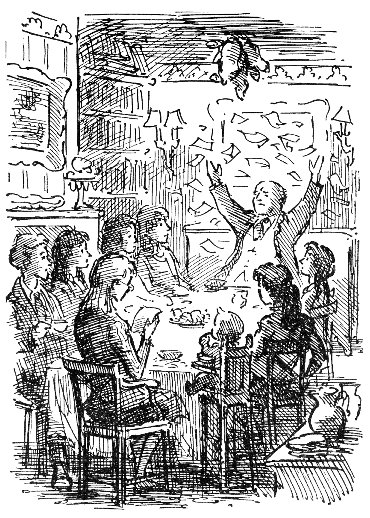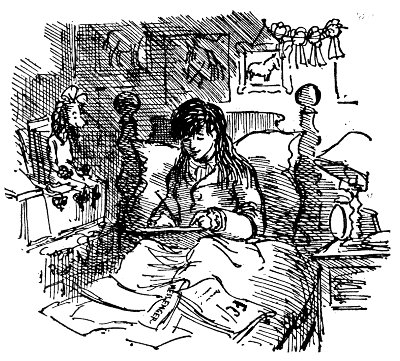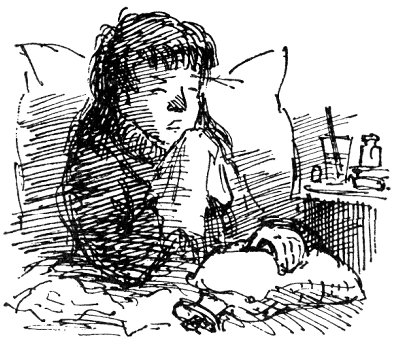"Daddy says that nowadays any schoolgirl of thirteen who writes a book is hailed as a genius. Well, I'm a schoolgirl and I'm nearly thirteen and though I don't think I am quite genius, I certainly wouldn't mind being hailed as one. Anyway, I've always wanted to write a book. The trouble before was that I had nothing really exciting to write one about—just school, and Friday (who is a year older) and my youngest sisters and my pony Gorse and my guinea pigs and what a nuisance grown-ups are. But of course those are what all the other geniuses of my age write about and I wanted mine to be a proper adventure story."So begins John Verney's 1959 novel Friday's Tunnel, which introduces the Callendar family: father Gus (Augustus), a newspaper columnist, who is married to Jan (January), an expatriot American who was once an art student in Paris. As February narrates, they decided "to carry on this calendar joke with their children," naming the eldest boy Friday for the day he was born on. February was born on a Sunday, so they named her after the month instead, and for subsequent children, tiring of the calendar, Gus and Jan named them in alphabetical order (Abigail, known as Gail; Beryllium, known as Berry; Chrysogon, "Chrys," and Desdemona, "Des").
It's hard not to love February after that introduction, and she is a most ingenious child: horse-mad as many girls of that age, a middling scholar, and continually amused by her brother's interests. At the time Friday's Tunnel takes place, he has become greatly absorbed in tunnels and is attempting to dig one through the chalk cliff at the rear of their property, Marsh Manor, a smallholding with a converted farmhouse, barn and outbuildings, just north of Chichester. Little does guess that Friday's building project will somehow intersect with a new mineral found on a small Mediterranean island called Capria (where, coincidentally, Gus was stationed during World War II), the officious Lord Sprockett and his madcap wife, a cottage called Deans, and the holiday tutor Gus has engaged for the summer to Friday's and February's dismay, a young college student named Robin Fawcett.
Friday's Tunnel is such a cracking great adventure story, mixing politics at the time with technological secrets and untrustworthy officials, that the first sequel is just slightly a letdown: February's Road involves the family with a lesser crisis that will prove more personal: a new trunk road, partially spurred by Gus's scathing newspaper columns about the need for good highways in Britain, will clip off half of the paddock and bring traffic past Marsh Manor and ruin some of the most beautiful stretches of the South Downs. February is accused of sabotaging the bulldozers about to start the clearing process and the whole family, including new little brother Hildebrand, plus Dr. Henry and his children Adam and Sasha, who were introduced in the previous book, become involved in the convoluted land deals that follow.
The first two books are narrated by February; however, in the third a chummy third-person narration serves as the story follows both February and Gail as they become involved in a youth movement called "ismo," which gives the name to the third book of the series. The Callendars are moving to Florence, Italy, for a year in connection with Gus' job and the special tutor that is engaged to teach Italian to both February and Gail, as well as two other students at her co-ed boarding school, embroils them all—including some surprising adults!—in the "ismo" movement, which seeks to keep peace in the world. Unfortunately "ismo" has been infiltrated by unscrupulous sorts who want to use it to make money—and the combination of art rackets, idealistic students, and an uninspired narrative method makes this the dullest of the books.
And alas, poor February. Becoming involved with "ismo," however good her intentions, marked the "beginning of the end" for her intelligent, delightful character. By the time Seven Sunflower Seeds rolls around, she is now infected by know-it-all teen disease and considers all adults stupid or untrustworthy, and those younger than her but old enough to disagree with her as appropriate targets for scorn. Sasha Henry, the "brainy" girl who helps February solve the mystery in February's Road has become a miniskirt-wearing, sarcastic "dolly bird" who plays "ismo's" idealism like a game. Together they unceasingly criticize the narrator of Seven Sunflower Seeds, Berry, who is now the age of February in the first novel.
Caprium rears its head again in this fourth book, intertwined with the mystery of a retired racehorse boarding at Marsh Manor (the Callendars are back from Italy), editor John Gubbins' boffin-in-training nephew Rupert, the machinations of "ismo" (now being used for bad ends) and, once again, Lord Sprockett, not to mention a new breakfast cereal, the poems of Edward Lear, and Gus Callendar's "Mame"-like aunt Sophie and the Callendars' less-than-helpful au pair, known to the family as "Mamzel." Aunt Sophie is a delightful character, but much of the novel is given over to poor Berry trying to figure out if her little brother's illness was caused by poison in the form of caprium and being proved wrong and right and wrong again.
The final book in the series finds the Callendars having sold Marsh Manor and living in the town of Querbury, where Berry gets involved in a movement to save the town's old maltings (a real-life project of John Verney). Rupert Gubbins reappears, as do several characters from February's Road, in particular Mike Spillergun, who now hosts an offbeat television series, and Peter Blow. The maltings was founded by the Samson family, and wayfaring Samuel Samson is rumored to have a treasure, the "Hoard" of the title, fabulous Incan artifacts, hidden somewhere on his property, once the home the Callendars have purchased. In addition, Gus is running for the town council, and Verney gets some sharp jabs in about small-town politics, not to mention small-town boys made good...or did they?
Something I found interesting about this last entry in the Callendar saga is that the eldest three might as well not exist any longer: February (who was engaged to Robin Fawcett at the end of Seeds), is mentioned only as "your eldest sister," Friday is mentioned only as having once been Peter Blow's friend, and Gail might have dropped from the face of the earth! It's as if now that they're grown Verney no longer has a use for them. Dr. Henry and his family are not mentioned, either, even though Berry is sick with glandular fever during a portion of the book—she's attended by another physician altogether.
The first two books are notable for containing Verney's delightful Edward Ardizzone-like illustrations in the text (Ismo only has chapter headers and the final books only cover illustrations). Here's a few:
The family at dinner after Christmas in February's Road:

Feb in bed after her accident in Friday's Tunnel:

And this delightful illo of Feb with a cold from February's Road:

Taken as a whole they are delightful portraits of middle-class English childhood forty years ago, but Friday's Tunnel is undoubtedly the best.
I'm at present reading John Verney's World War II memoirs, which are quite offbeat compared to the more serious experiences I've been reading about (Halsey's Typhoon, etc.). It's considered a classic British war memoir.
Here's a Telegraph article commenting on Friday's Tunnel.
John Verney supported the Farnham Trust and created something called "The Dodo Pad."

21 comments:
It's too bad that the entire series isn't as good as the first one sounds. I believe I will try to read Friday's Tunnel and skip the rest. Thanks for the review
YMMV! I'd at least try February's Road as well and also Seven Sunflower Seeds.
ISMO is one of my favourites, and I would recommend it to anyone. But they all have merit to a greater or lesser degree, and I would suggest that anyone read them. Indeed I DID suggest that very thing
on my blog only last week:
which I think is a mildly intriguing coincidence..
I loved this series as a sixth-grader. I've just ordered February's Road via Amazon; copies are much less expensive then those of Friday's Tunnel I notice. I'll be interested to re-read it almost 40 years later.
Something I only just discovered is that most of his adult books also fit in with the `Friday's Tunnel` universe. His second novel `A Nice day for a Picnic` - for example - is set in Querbury and features Barney Melo and several other characters who turn up in the series including Victor Bone and Captain Gumble, and mentions of Lord Sprockett. Bone, Gumble, and Captain Carstammers-Waghorn (from `Seven Sunflower Seeds`) also turn up in his two semi fictionalised accounts of the war years...
Enjoyed your post very much. My sister and I loved the first two books in, I guess, the 60s(although were always confused by the end) but Ismo drove us insane. We can still make the strange gesture (which I recall as pinky touching chin with one eye shut?). I have managed to collect all five books, and plan to a) read them in order at some point, and b) introduce them to my nieces and nephews.
Ismo is the world's greatest book, end of story. When I first read it I made the sign like mad everywhere, hoping that someone would reciprocate. I haven't read the last books, but from the sounds of things I'd best just leave it at number 3. How sad.
I agree with the readers who've enjoyed ismo. While Friday's Tunnel was entertaining in a lighthearted way that I enjoyed, but ismo creates a complete different feeling with its global movement that I personally find quite appealing. It's too bad these books are out of print; something like ismo, minus the fiasci, is just what the world needs at present. I have yet to read February's Road, so I can't comment on it.
I too found ismo the most fun of the bunch, though it's a tough call. In their different ways each one is marvelous, with the possible exception of Samson's Hoard which somehow fell a bit flat. Maybe I'm just too old now.
Anyway thanks for mentioning them!
Samson's Hoard was the weakest of the bunch. As far as the ISMO sign is concerned, somewhere I have a sketch by Sir John V himself, which he sent me of him doing the ismosign. I have referred to the Callendar books sevral times in my own books, and see it as a minor part of my life's work to proselytise about them...
I'm unfamilar with John Verney's writing apart from his WWII memoirs which are indeed a classic of the genre ("Going To The Wars"). He is very understated and writes evocatively whilst underlining the hardships of the time (being away from family, not seeing his young son for several years, fighting in the desert for years on end etc). And no big timing or name dropping - I didn't discover until years later that he was actually Eton-educated and farily aristocratic; there is no snobbery conveyed by his writings.
Good stuff and power to your elbow too.
I remember liking Friday's Tunnel enough to read it through more than once. I read February's Road as well, but never reread it. I think I discovered Robert Louis Stevenson next and went off among those novels illustrated by Wyeth.
I used to own a copy of ismo until my house burnt down in a firestorm nearly seven years ago. I think John Verney would be pleased to know that it would take a most vicious and destructive act of nature to make me part from that book. I thought it was a fab read, not dull at all, and I would love to read it again.
I read Friday's Tunnel this spring and enjoyed it *so* much I immediately searched ebay for others in the series. I've finished February's road, which was fine, but not quite as charming as Friday's Tunnel. ISMO and Seven Sunflower Seeds are on my desk waiting for me. I'm looking forward to reading the controversial ISMO next. I have yet to get ahold of Samson's Hoard. These must have been popular library books -- as all of mine obtained on ebay and abebooks have been the hold library edition versions, which is nice, they are library discard but are in fantastically sound shape with nice pictorial covers.
-SHawn
Wow, I can't believe there are other Verney fans! I love ALL the books but Ismo is by all means my favorite. I spent *years* trying to work out, at the very end, which painting gets swapped for which. But I've read all of them many times and adore them all.
Loved all the books (except the last one, Samson's Hoard, seemed a bit weaker.) Hard to pick a favorite but ismo is right up there and also Seven Sunflower Seeds. Fun, smart, charming. I still reread them from time to time.
I have been struggling for years to get various children's books published and once a well-known publisher in London, after flatly dismissing my submissions as something in which she could never be interested asked me, before lowering the receiver, if there was a particular children's author who had most influenced me or whose work I found especially appealing and I said without hesistating "John Verney" and she said "Oh, my God, well that explains it," and put the phone down.
Good god, someone else ran about making the ISMO sign. I did that too. I'm not such a dork as I thought! Or maybe I'm just a nerd...
I (re)read all four, but I read Friday's Tunnel first and most. It's been years, but somewhere, packed away, I still have all of them. Friday's Tunnel was my second favorite book growing up, right after Madeleine L'Engle's A Wrinkle in Time.
I still do the ISMO sign occasionally, usually in a busy supermarket. No-one has ever responded :(
Have just written an article on John Verney for the Scribbler. One of the greats. I enjoyed your piece very much indeed.
Post a Comment